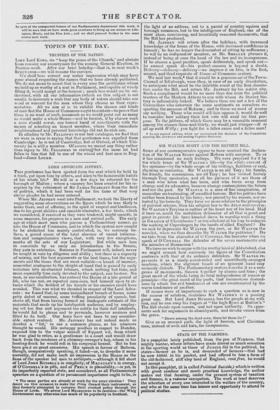. SIR WALTER SCOTT AND THE REFORM BILL.
SOME of oar contemporaries appear to have received the declara- tion of Sir WALTER SCOTT against Reform with surprise. To us it has occasioned no such feelings. We were prepared for it by the whole tenor of Sir WALTER'S life—by the whole current of his opinions—by the whole scope of his writings, fictitious or real, rhyming or reasoning. Sir WALTER is an old. Tory ; his family, his friends, his connexions, are all Tory; he has viewed history thiough Tory spectacles, and all his picluies of it are those of a man who loves what has been, and who turns away from change and its advocates, because change contemplates the future and not the past. Sir WALTER is a man of fine imagination, of masculine understanding, of unsullied honour. But his politics have neither been framed by his fancy, -nor proved by his reason, nor se- lected ley his honesty. They bare no more relation to the principles of political science, than his religion has to the Arian controversy. Sir WALTER'S Toryism is neither of his heart nor of his head. Had it been so, could the matchless delineator of all that is good and great in private life have kneeled down to worship such a thing as GRAHAM of Claverhouse ? or travelled out of his way to eulogize the sacking of Copenhagen by the hands of allied England ? e'Do we seek to depreciate Sir WALTER the poet, or Sir WALTER the novelist, when we thus describe Sir WALTER the politician ? Do we take from the character of O'CoNNEoe the barrister when we speak of O'CONNELL the defender of the seven sacraments and the miracles of Romanism ?
We have no wish to argue with the worthy laird of Abbotsford, else
we might, remark how curiously his figure of the Constitution contrasts with that of its ordinary defenders. Sir WALTER re- presents it as a nicely-constructed and scientifically-arranged machine, which the slightest touch of an ignorant hand may seriously disturb. The Parliamentary orators describe it as a con- genes of movements, thrown teirether by chance and time ; the great merit of the whole being its total independence of reason or
.principle—the great merit of the parts, that harmonious discord- ance by which the evil tendencies of one are counteracted by the worse tendencies of another.
If names were of importance in such a question as is now in the course of solution, doubtless Sir WALTER'S is a passing great one. But Lord JOHN RUSSELL has the people along with him, and he can snap his fingers at "the high-flyers at Button's." The Bill stands upon reason, and not upon authority. Its oppo- nents seek for arguments in churchyards, and invoke voices from the grave.
"Down among the dead men, there let them lie !"
Give us an onward path, the light -of heaven, and Christian men, instead of' owls and bats, for companions.


























 Previous page
Previous page